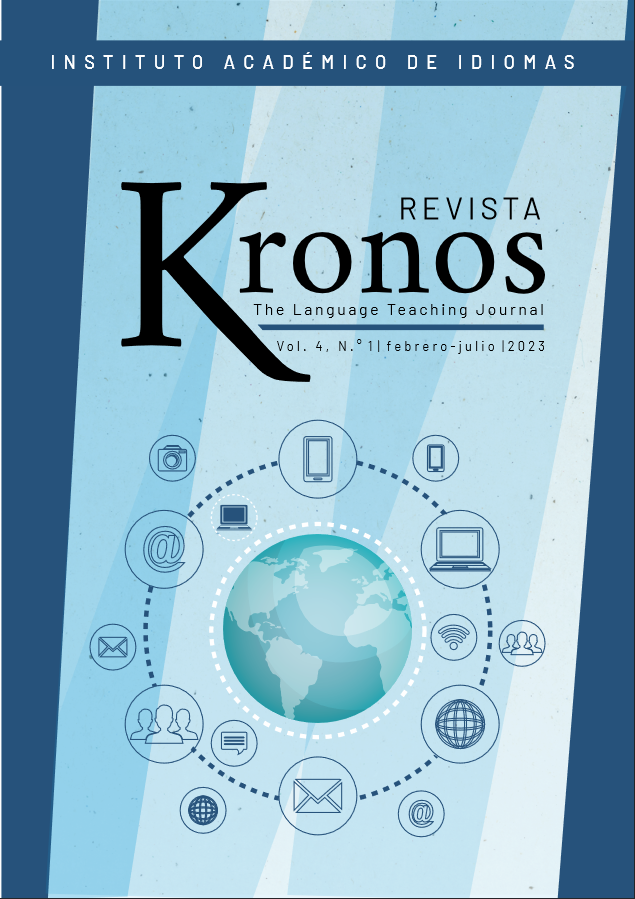Peer Assessment Effect in Speaking Skills by means of CLT-Drama activities in EFL B1.2 Students
DOI:
https://doi.org/10.29166/kronos.v4i1.4316Keywords:
Drama, Nonlinear Thinking, Peer Assessment, Social Learning, Speaking SkillsAbstract
This action research study aims to determine the close proximity and significance there is between peer assessment and drama, as elements that foster Speaking Skills. The dynamics of these elements generate an efficient learning process. It makes use of a careful backward design as well as Gradual Release of Responsibility-GRR considerations, and the use of CLT activities. The project was implemented within a time frame of 4 weeks,2 hours a day; a total of 40 hours were reported in this research by means of CLT-Drama activities-in EFL B1.2 Students, its impact and improvement in Speaking Skills. Drama is a unique space that promotes and sustains motivation, as it is a social learning ground naturally filled with interaction that makes transfer viable. Several assets derive from this experience creativity, tolerance, nonlinear thinking, receptivity to other’s ideas, breaking with stereotypes, helps self-esteem by resourcing to expression of feeling, and opinions. This is a pre/posttest design study with instruments to collect data for the Quantitative research question: Does peer assessment have an effect in Speaking Skills when using CLT activities in EFL B1.2
Public Tech College Students? Data collection for qualitative questions are based upon the researcher’s field notes in reply to qualitative question: How does peer assessment have an effect in Speaking Skills when using CLT activities in EFL B1.2 Public Tech College Students? Finally, an invitation to reflect on the importance of including peer assessment,
drama activities and art to fulfill holistic learning in the English classroom.
Downloads
References
AL-Garni, S. A., & Almuhammadi, A. H. (2019). The effect of using communicative language teaching activities on EFL students’ speaking skills at the University of Jeddah. English Language Teaching, 12(6), 1—15. https://doi.org/10.5539/elt.v12n6p72 Barbee, M. (2010). Drama as pedagogy in l2 learning: a literature review. language, culture, Literature, 2(1), 1–25. https://www.matthewbarbee.com/uploads/1/6/8/9/16895428/drama_as_pedagogy_in_l2_learning_1.pdf Burns, A. (2010). Doing action research in English language teaching. In Taylor & Francis (Ed.), A Guide for Practitioners (pp.1–30). https://doi.org/10.4324/9780203863466 Consejo de Educación Superior (2019) Reglamento de Régimen Académico Superior [Superior Academic Regulations Regime]. https://www.ces.gob.ec/lotaip/2017/Diciembre/Anexos Procu/An-lit-a2-Reglamento de Régimen Académico.pdf Cheng, W., & Warren, M. (2005). Peer assessment of Language proficiency. Language Testing, 22(1), 93–121. https://doi.org/10.1191/0265532205lt298oa Council of Europe, Framework of Reference for languages: Learning, teaching, assessment (2018). http://www.coe.int/lang-cefr Creswell, J. W. (2015). A concise introduction to mixed methods research. SAGE (Vol. 1999, pp. 1–6). Exam English Ltd, all rights reserved. (n.d.). Exam English ✓. B1 level English language practice tests. https://www.examenglish.com/B1/index.php Felzmann, H. (2009). Ethical issues in school-based research. Research Ethics, 5(3), 104–109. https://doi.org/10.1177/174701610900500304 Fisher, D., & Frey, N. (2008). A framework for the gradual release of responsibility. Gradual release of responsibility. Gradual release of responsibility | introduction. https://thinkport.org/grr/ Freire, P. (2006). Pedagogía de la autonomía. Saberes necesarios para la práctica educativa. [Pedagogy of Autonomy. Needed wisdom for educational praxis],1(1) (pp. 1-139). Educación yTerritorio http://www.revistasjdc.com/main/index.php/reyte/article/view/145 Hidayat, O., & Apriyanto, S. (2019). Drama excerpt: Tool in enhancing speaking ability for junior high school. IJECA International Journal of Education and Curriculum Application, 2(3), 1. https://doi.org/10.31764/ijeca.v2i3.2029 Janudom, R., & Wasanasomsithi, P. (2009). Drama and Questioning Techniques: Powerful Tools for the Enhancement of Students’ Speaking Abilities and Positive Attitudes towards EFL Learning. ESP World, 8(5) (pp.1-5) https://doi.org/1098-6596 Johnson, D. W., & Johnson, R. T. (1981). Effects of cooperative and individualistic learning experiences on interethnic interaction. Journal of Educational Psychology, 73(3),(pp.444–449). https://doi.org/10.1037/0022-0663.73.3.444 Joo, S. H. (2016). Self- and Peer-Assessment of Speaking. Working Papers in TESOL & Applied
ECLLM
Linguistics, 16(2),1—16. https://doi.org/doi.org/10.7916/salt.v16i2.1257 King, J. (2002). Preparing EFL Learners for Oral Presentations. The Internet TESL Journal, 8(3),1—9. https://doi.org/10.6420/DHJHS.200207.0401 Krashen, S. (2013). Second Language Acquisition: Theory, Applications and some Conjectures (pp. 13). Cambridge University Press. www.cambridge-la.org Lessard-Clouston, M., & Lee, G. (2019). Second language acquisition applied to English language teaching. TESL-EJ, 22(4) (pp.1-3) https://tesl-ej.org/pdf/ej88/r1.pdf. Otoshi, J., & Heffernan, N. (2007). An analysis of peer assessment in EFL college oral presentation classrooms. The Language Teacher. https://www.researchgate.net/publication/255950623 Parker, G., Guilott, M. C., Wigby, K., & Owen, L. A. (2021, February 26). Making learning stick. Learning Forward, (pp.1-6). https://learningforward.org/journal/beyond-the-basics/making-learning-stick/ Richards, Jack & Rodgers, T. S. (1999). Approaches and Methods in Language Teaching, Cambridge University Press. Richards, J. (2006). Communicative Language Teaching Today. Cambridge University Press. Savignon, S. J. (1991). Communicative language teaching: State of the art. TESOL Quarterly, 25(2), 261. https://doi.org/10.2307/3587463 Shaheed, F. (2013). Libertad Artistica [Artistic Freedom]. https://es.unesco.org/creativity/sites/creativity/files/artistic_freedom_esp_pdf_web.pdf Shanti, Divaharan Lourdusamy, A. (2003). Influence of peer assessment on the quality of cooperative learning: A pilot study. REACT. 2003(2), (pp.103-113) http://hdl.handle.net/10497/3870 Soulsby, E. (2009). Assessment Notes. University of Connecticut. http://cid.buu.ac.th/information/Eric_Soulsby_Assessment_Notes.pdf Vygotsky, L. S. (2000). Manuscrito de 1929. Educação & Sociedade, 21(71), 21–44. https://doi.org/10.1590/s0101-73302000000200002 Walsh, C. (2013). Pedagogías decoloniales: Prácticas insurgentes de resistir, (re)existir y (re)vivir. [Decolonial Pedagogies: Resistance Insurgent Practices, (re)existing and (re)living]. Abya Yala, 9(1). 66—70. http://dx.doi.org/10.5212/PraxEduc.v.10i2.0015 Wiggins, G. (1991). The case for authentic assessment. Practical Assessment, Research and Evaluation, 2(2), (pp.4) https://doi.org/10.7275/ffb1-mm19 Wiggins, G. (2012). Transfer as the Point of Education. Granted, and Thoughts on Education. https://grantwiggins.wordpress.com/2012/01/11/transfer-as-the-point-of-education/
Zafeiriadou, N. (2009). Drama in language teaching: a challenge for creative development. Issues, 23, (pp.4-9) https://www.academia.edu/5102011/Drama_in_language_teaching_a_challenge_for_creative_development
Published
How to Cite
Issue
Section
License
Copyright (c) 2023 Carmen Alicia Moncayo Noroña, Jardel Coutinho dos Santos, Rossana Ramírez

This work is licensed under a Creative Commons Attribution-NonCommercial-ShareAlike 4.0 International License.












